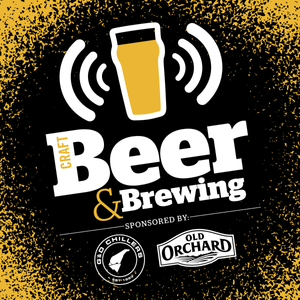
Natural Wine with Marc Papineau
Explicit content warning
02/09/24 • 65 min
Marc Papineau has been filling our wine glasses in Seattle for decades. Marc is the proprietor of Cantina Sauvage — a wine shop he opened last year in Melrose Market, alongside Cafe Suliman in the Capitol Hill neighborhood of Seattle. There, he curates a unique selection of independent wines that are, as he coins, “unfuctwith”: wines that have been only minimally altered by human intervention, which happens at the behest of a person, not a corporate entity.
Wine is in the revelries of a renaissance in Seattle, fueled by the natural wine craze: those “pet nat”, “skin contact”, “orange” bottles with colorful labels. Those bottles from grapes you never heard of (good) and a frequent sidestepping of traditional labeling standards. Some are delicious. Some are...challenging. However you feel about them, their impact on drinking patterns here and in other urban centers deserves a closer look. Natural wine's popularity presents an alluring contrast from big-name, mass-produced wines manipulated into homogeneity. It demonstrates savvy and awareness that it does matter where what you eat comes from.
Stick with this episode: at first it may sound like its more of a conversation for wine nerds, but it is a study on this city's consumption patterns and how they've changed (rather radically!) over the past decade.
At about minute 2:24, where Chris asks, “um, which one of them is dry?” and we all crack up because his question cuts through our heavy conversation like an acidic wine through fatty cheese. It's a funny question because “dry” is one of those words people often use when pressured to describe what they’re looking for in a wine. It's a question that, to a wine purveyor, can signal a lack of knowledge about or interest in wine.
Which patrons sound most knowledgeable to servers and winesellers? People who ask questions. People who are willing to place trust in their purveyor to guide them on a discourse about the right wine for that moment in time.
This episode is just that: a casual conversation with a guy who knows wine. Chris and I ask things we always wanted to know but were afraid to ask, for fear of sounding clueless. I’ve been in that position, Chris has been in that position, and a casual survey among friends indicates that many of us have been in that position.
We talk about what makes a good wine good and what makes a tank wine industrial. We’ll talk about how to identify the differences among all the degrees between those two ends of a spectrum. (Hint: if you’re buying it at the supermarket, it is probably industrial).
“If you care, then you’re probably not in a grocery store buying wine. You should go to a place where they know their wine.” --Marc Papineau
Marc Papineau has been filling our wine glasses in Seattle for decades. Marc is the proprietor of Cantina Sauvage — a wine shop he opened last year in Melrose Market, alongside Cafe Suliman in the Capitol Hill neighborhood of Seattle. There, he curates a unique selection of independent wines that are, as he coins, “unfuctwith”: wines that have been only minimally altered by human intervention, which happens at the behest of a person, not a corporate entity.
Wine is in the revelries of a renaissance in Seattle, fueled by the natural wine craze: those “pet nat”, “skin contact”, “orange” bottles with colorful labels. Those bottles from grapes you never heard of (good) and a frequent sidestepping of traditional labeling standards. Some are delicious. Some are...challenging. However you feel about them, their impact on drinking patterns here and in other urban centers deserves a closer look. Natural wine's popularity presents an alluring contrast from big-name, mass-produced wines manipulated into homogeneity. It demonstrates savvy and awareness that it does matter where what you eat comes from.
Stick with this episode: at first it may sound like its more of a conversation for wine nerds, but it is a study on this city's consumption patterns and how they've changed (rather radically!) over the past decade.
At about minute 2:24, where Chris asks, “um, which one of them is dry?” and we all crack up because his question cuts through our heavy conversation like an acidic wine through fatty cheese. It's a funny question because “dry” is one of those words people often use when pressured to describe what they’re looking for in a wine. It's a question that, to a wine purveyor, can signal a lack of knowledge about or interest in wine.
Which patrons sound most knowledgeable to servers and winesellers? People who ask questions. People who are willing to place trust in their purveyor to guide them on a discourse about the right wine for that moment in time.
This episode is just that: a casual conversation with a guy who knows wine. Chris and I ask things we always wanted to know but were afraid to ask, for fear of sounding clueless. I’ve been in that position, Chris has been in that position, and a casual survey among friends indicates that many of us have been in that position.
We talk about what makes a good wine good and what makes a tank wine industrial. We’ll talk about how to identify the differences among all the degrees between those two ends of a spectrum. (Hint: if you’re buying it at the supermarket, it is probably industrial).
“If you care, then you’re probably not in a grocery store buying wine. You should go to a place where they know their wine.” --Marc Papineau
Previous Episode

Indigenous Food with Valerie Segrest
The foods that sustain us are becoming less nutritious (via National Geographic), reduced to commodities and cheaply mass-produced to feed a growing global population of nearly 8 billion. Along the way, we’ve lost touch with the planet’s provisions. Yet real food — both nourishing and delicious — is often as close as our own neighborhoods, and our guest Valerie Segrest knows how to find it.
Valerie Segrest is an author, Native nutrition educator, and member of the Muckleshoot tribe. Her work focuses on foods that are endemic to North America. In the book Valerie co-authored with Indigenous Food Lab, Indigenous Home Cooking: Menus Inspired by the Ancestors, you’ll find wisdom about wild plants and familiar, accessible ingredients like bison, salmon, berries, squash, sweet potatoes, and more.
This episode will make you hungry for knowledge about the world around you. Valerie talks about the elusive and charismatic morel mushroom, the ubiquitous and recognizable dandelion, and the softer side of stinging nettles. She praises the nationwide movement of tribes restoring ecosystems in the form of fisheries management and other projects. You’ll learn about “weeds” that are both food and medicine, telling time according to nature’s rhythms, the many names for the moon, how there are never just four seasons, and sweet birthday gifts that make Valerie want to eat mountains.
Valerie also underscores the importance of food sovereignty. This is crucial for Native communities, who are disproportionately affected by food insecurity and related health conditions, according to Feeding America. Valerie’s efforts contribute to the reclamation of traditional foodways and the re-emergence of an Indigenous cuisine, in which local, seasonal, and sustainable ingredients are front and center. In a time when so much of our food comes from somewhere far away, honoring Indigenous foods is an action that all of us can take to recognize that we are still a part of nature — and always will be.
Next Episode

Regenerative Farming with Eiko Vojkovich
This week’s conversation is with Eiko Vojkovich of Skagit River Ranch. Theirs is a small but mighty family ranch she and her daughter, Nicole, run together. They sell grass-fed and -finished cattle, pastured hogs, pasture-raised poultry and eggs at Seattle Neighborhood Farmers Markets and some co-ops around the Puget Sound.
When I came to Seattle in the late 90’s, I was ecstatic to learn about the existence of farmers markets, something that didn't exist in the suburban area of my upbringing (but more and more are popping up everywhere!). I met Eiko at her stall at the University Farmers Market around the turn of the century, where she introduced me to the taste of grass-fed cows and acorn-fed pigs. I fell in love and wanted to know more, so I took a trip to their ranch where they taught me about rotational grazing, regenerative agriculture, and happy animals.
The majority of the meat we consume in America is produced by large-scale farms and sold at multinational chain supermarkets, where it is virtually impossible to tell how people, places, and animals in their care are treated. Factory farms, concentrated animal feeding operations and massive processing plants compromise human and animal welfare as they leave huge carbon footprints.
But small-scale farms like Skagit River Ranch do still exist in every state in the country, and it makes sense to find them: they are more likely to employ regenerative and sustainable practices, they're often family run, and they sell their products directly or via area farmers markets.
You can't get this stuff in a supermarket!
If you like this episode you’ll love
Episode Comments
Generate a badge
Get a badge for your website that links back to this episode
<a href="https://goodpods.com/podcasts/umami-podcast-627369/natural-wine-with-marc-papineau-83463701"> <img src="https://storage.googleapis.com/goodpods-images-bucket/badges/generic-badge-1.svg" alt="listen to natural wine with marc papineau on goodpods" style="width: 225px" /> </a>
Copy




